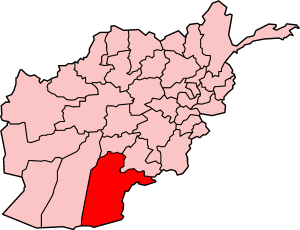
Kandahār is one of the thirty-four provinces of Afghanistan, located in the southern part of the country, sharing a border with Pakistan, to the south. It is surrounded by Helmand in the west, Uruzgan in the north and Zabul Province in the east. Its capital is the city of Kandahar, Afghanistan's second largest city, which is located on the Arghandab River. The greater region surrounding the province is called Loy Kandahar. The Emir of Afghanistan sends orders to Kabul from Kandahar making it the de facto capital of Afghanistan, although the main government body operates in Kabul. All meetings with the Emir take place in Kandahar, meetings excluding the Emir are in Kabul.

Spin Boldak is a border town and the headquarters of Spin Boldak District in the southern Kandahar province of Afghanistan, next to the border with Pakistan. It is linked by a highway with the city of Kandahar to the north, and with Chaman and Quetta in Pakistan to the south. Spin Boldak has the second major port of entry between Afghanistan and Pakistan, the Wesh-Chaman border crossing. It is also a major transporting, shipping and receiving site between the two neighboring countries.

The Taliban insurgency began after the group's fall from power during the 2001 War in Afghanistan. The Taliban forces fought against the Afghan government, led by President Hamid Karzai, and later by President Ashraf Ghani, and against a US-led coalition of forces that has included all members of NATO; the 2021 Taliban offensive resulted in the collapse of the government of Ashraf Ghani. The private sector in Pakistan extends financial aid to the Taliban, contributing to their financial sustenance.
Operation Mountain Thrust was a NATO and Afghan-led operation in the War in Afghanistan, with more than 3,300 British troops, 2,300 U.S., 2,200 Canadian troops, about 3,500 Afghan soldiers and large air support. Its primary objective was to quell the ongoing Taliban insurgency in the south of the country.

Operation Mountain Fury was a NATO-led operation begun on September 16, 2006 as a follow-up operation to Operation Medusa, to clear Taliban insurgents from the eastern provinces of Afghanistan. Another focus of the operation was to enable reconstruction projects such as schools, health-care facilities, and courthouses to take place in the targeted provinces.

The following items form a partial timeline of the War in Afghanistan. For events prior to October 7, 2001, see 2001 in Afghanistan.
Events from the year 2007 in Afghanistan.

Operation Shahi Tandar, also called Operation Atal, was a series of operations by Coalition troops from the British 42 Commando Royal Marines, Royal Canadian Regiment, 2nd Battalion 2nd Infantry Regiment, and the Afghan national military in central Helmand province and the Western Panjwayi and Western Zhari districts of Kandahar, Afghanistan from January 7–31, 2009.
The 2001 Bombing of Kandahar was a series of military operations conducted in and around Kandahar, Afghanistan, during October 2001, as part of the start of the United States' military operations in Afghanistan.
The following lists events that happened in 2013 in Afghanistan.
The following lists events that happened during 2015 in Afghanistan.
On 10 January 2017, multiple bombings in Afghanistan occurred at government and tribal establishments during the renewed War in Afghanistan. The Taliban claimed responsibility for all but one of the attacks, which targeted a United Arab Emirates diplomatic mission. In total, at least 64 to at least 88 people were killed and at least 94 were wounded, with at least three attackers also being killed. Other attacks may have taken place.
Events in the year 2017 in Afghanistan.
Events in the year 2018 in Afghanistan.

The Islamic State–Taliban conflict is an ongoing armed conflict between the Islamic State and the Taliban in Afghanistan. The conflict escalated when militants who were affiliated with Islamic State – Khorasan Province killed Abdul Ghani, a senior Taliban commander in Logar province on 2 February 2015. Since then, the Taliban and IS-KP have engaged in clashes over the control of territory, mostly in eastern Afghanistan, but clashes have also occurred between the Taliban and IS-KP cells which are located in the north-west and south-west.
On 17 October 2017, insurgents attacked Gardez, Paktia Province and Ghazni Province in Afghanistan.
War crimes in Afghanistan covers the period of conflict from 1979 to the present. Starting with the Soviet invasion of Afghanistan in 1979, 40 years of civil war in various forms has wracked Afghanistan. War crimes have been committed by all sides.







